The opening ceremony of the 2018 Cumulus International Conference was held at Jiangnan University at 9 am on November 1. Among the dignitaries and distinguished guests attending the conference opening ceremony were DerongChen, member of the Party Standing Committee for Wuxi municipality and chairperson of the United Front work department in Jiangnan University; Qingbao Zhu, Secretary of the Party Committee of Jiangnan University; Elsebeth Gerner Nielsen, Vice-chairperson of Cumulus; Birgit Mager, Chairperson ofService Design Network; Clare Shine, Vice-President and CEO of Salzburg Global Seminar; Professor Makoto Watanabe, Vice-President of Chiba University in Japan;Ezio Manzini, the founder of the Network on Design for Social Innovation and Sustainability; Craig Vogel, the Executive Director of the School of Digital Media Integration at the University of Cincinnati in America; Jun Cai, a professor at Tsinghua University and the initiator of Doctoral Forum on Design Research; Xiaojun Wu, Dean of Academy of the Science and Technology at Jiangnan University; and Huanming Liu, the director of the Department of Social Sciences in Jiangnan university.The conference was hosted by Bo Jiang fromthe Office of International Exchange and Cooperation in Jiangnan University.
Secretary of the university Party Committee Qingbao Zhu extended a warm welcome to the attendees at the Cumulus International Conference, and conveyed his gratitude to Cumulus for its support and trust. He referred to the conference as a platform for thought leaders of international colleges of art design and media, and expressed his belief that the convening of this conference will provide a new vision and inspiration for development and the cultivation of talent in the international art design disciplines. 2018 marked the 60th anniversary of Jiangnan University. He also expressed his hope that the conference would further promote the internationalization of the discipline of design at Jiangnan University.
Local Party Standing Committee member DerongChen extended his welcome on behalf of the government of Wuxi to all the guests and representatives from home and abroad. He pointed out that Wuxi, as a city with a deep historical and cultural heritage and a solid economic foundation, attaches great importance to design and the creative industries, based on the principle of openness and diversity. Among a wide range of activities, Wuxi is actively promoting exchanges, cooperation, and academic research among colleges and universities including Jiangnan university, as well as supporting initiatives related to political, industrial, and economic aspects. He expressed the hope that the participants would come away from the conference with a fuller understanding of Wuxi and be interested in assisting its economic development.
The Vice-Chairperson of the Cumulus, Elsebeth Gerner Nielsen said inherspeech that design industry practitioners should not only focus on creative design itself but also try to convert their own creativity into practice. This means creating better products through which they can provide better educational opportunities in the field of design. They should make their own voices heard on the issues of the protection of the rights and interests of women and children, the improvement of the living environment and life quality, achieving sustainable development goals, as well as on important issues concerning human development and the future. Special funds and projects will be established by Cumulus to facilitate the above work. Finally, Nielsen conveyedherthanks to the staff of Cumulus for their valuable work as well as to the leaders of Wuxi, and to the teachers and students of Jiangnan University and the School of Design for their support.
Professor Jie Wei, Vice-Dean of the School of Design, further interpreted the theme of the conference from the perspective of discipline development. She pointed out that the theme of the conference concerns extensive transformation and design opportunities. A focus on the economy and society against the backdrop of this huge transformation entails new challenges, spaces and opportunities for design. She emphasized the need to break through established patterns of thinking and confront the various issues in the transformation process, explore design conditions and trends in the transformation era, and to ensure that design has a voice in articulating common challenges in the context of ‘globalization 3.0’.
Founded in 1990, Cumulus brings together the world's most prominent design colleges, and is the only international organization of arts, design and media colleges officially recognized by UNESCO. The conference was held at Jiangnan University from October 31 to November 3, on the theme of ‘extensive transformation and design opportunities’, and hostedmore than thirty internationally-renowned speakers and nearly four hundred delegates from more than a dozen countries and regions such as China (including Hong Kong and Taiwan), the United States, Britain, Italy, Denmark, France, Austria, the Netherlands, Finland, Australia, Malaysia, Portugal, France, and Japan. Through keynote speeches, theme-based fora, group seminars, design workshops, special design exhibitions and other forms, the conference explored the current status of, and trends in, design disciplines in the context of social development, local responses to common challenges in the global context, as well as emerging practices, research and education. Participants also reflected on new design attributes, roles and cultures.
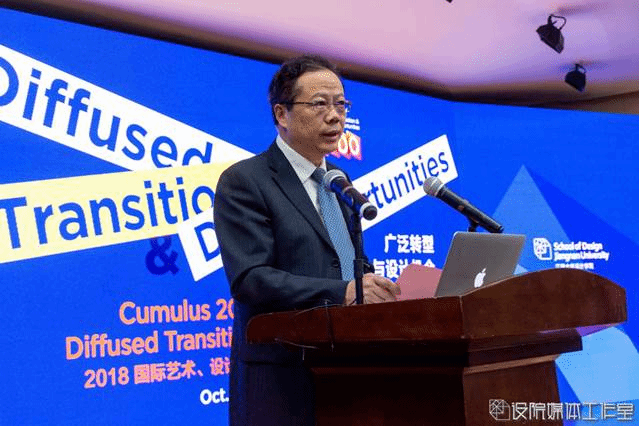
Secretary of the Party Committee of Jiangnan University, Qingbao Zhu addresses the gathering
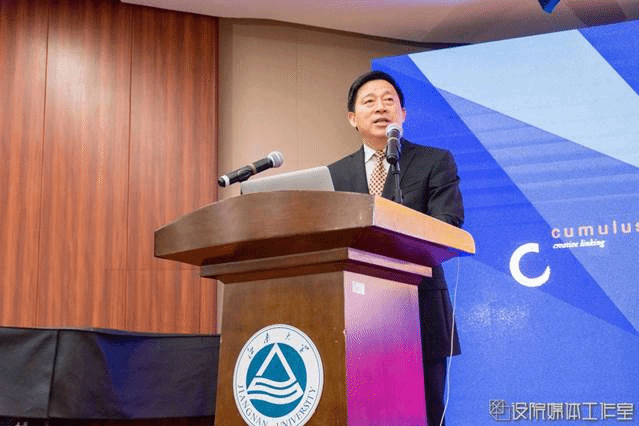
DerongChen, member of the Party Standing Committee for Wuxi municipality and chairperson of the United Front work department in Jiangnan University,
delivers a speech
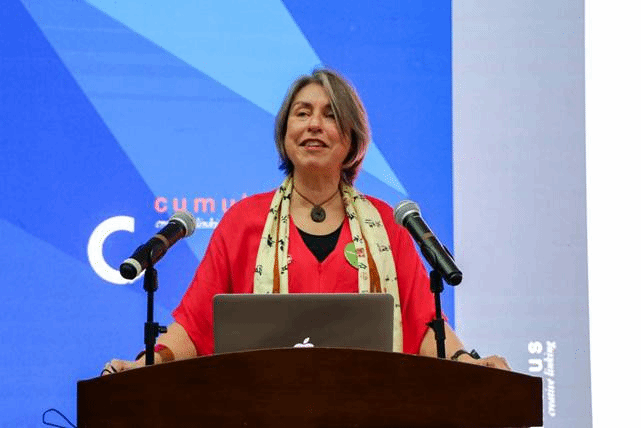
Vice-chairperson of Cumulus, Elsebeth Gerner Nielsen addresses the gathering
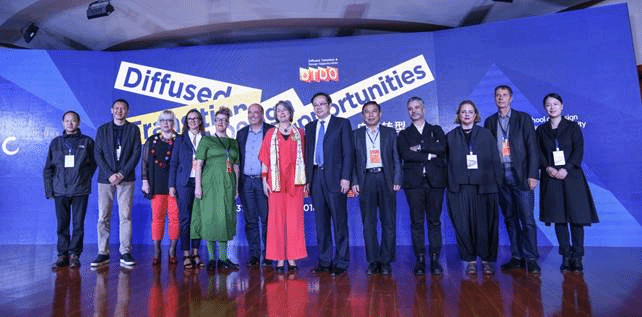
Participants take a group photo
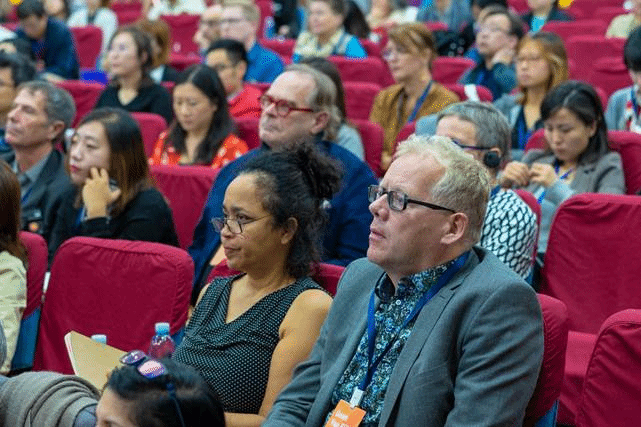
Participants watch the opening ceremony


